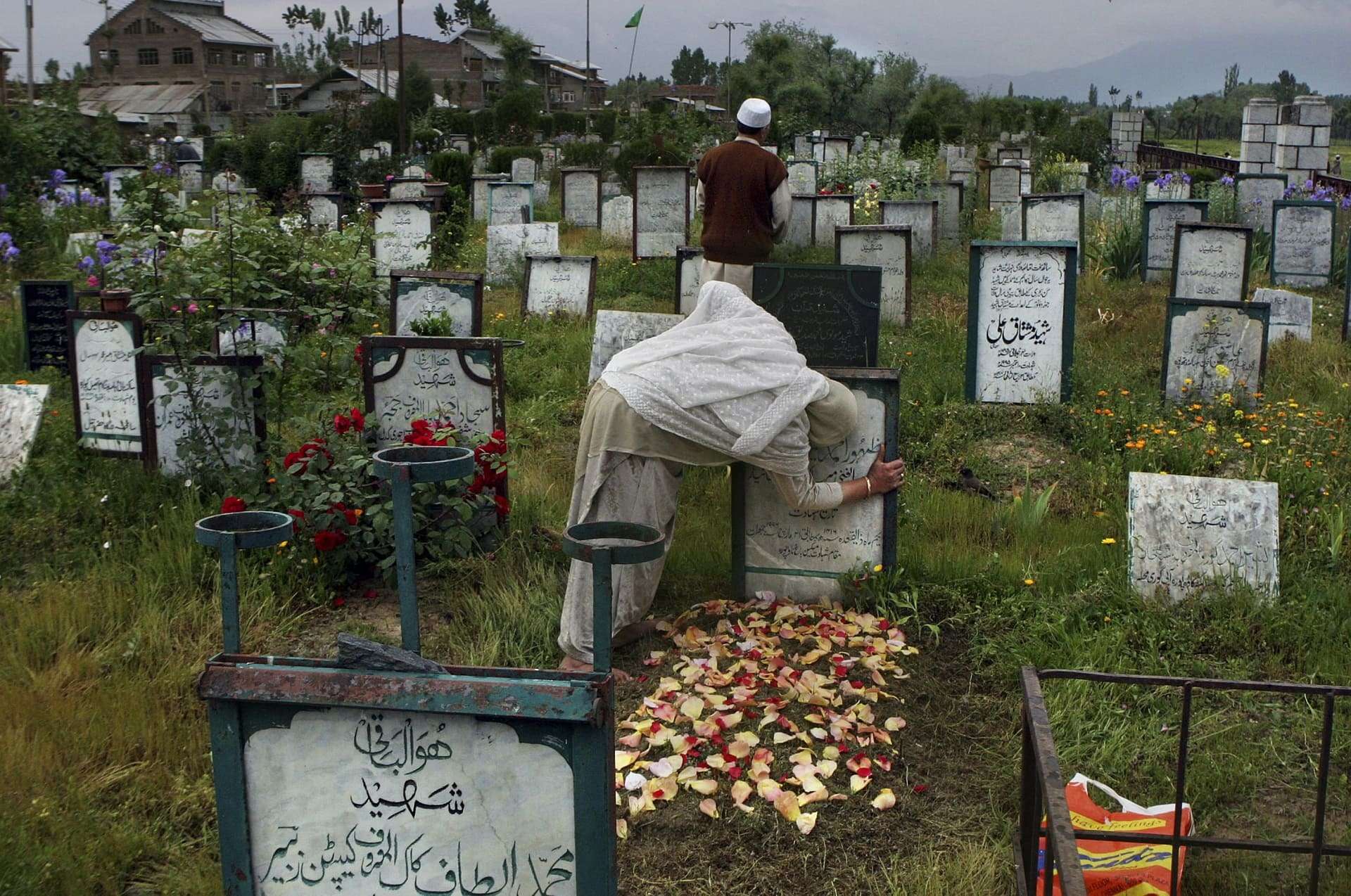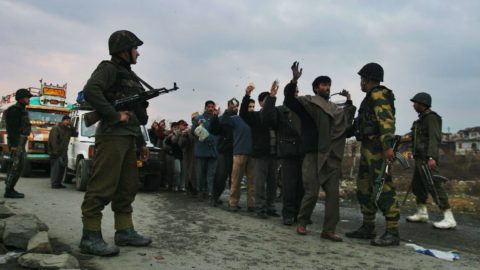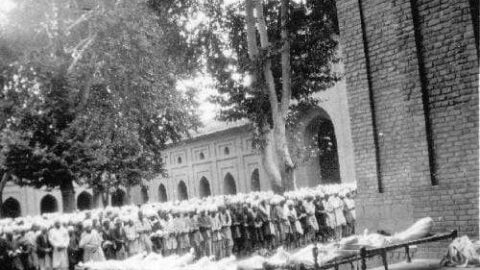A Mini-Report on India's Response to the November 10 Attack Justice for All — When…
August 5 Special: How India is legislating Kashmir out of existence
Interview with Nasir Qadri, international law practitioner and critical legal scholar
By Staff Writer
More than six years after India revoked Article 370, stripping Jammu and Kashmir of its limited autonomy, the region continues to undergo a radical transformation. Since August 5th, 2019, the Indian government not only bifurcated the state into two Union Territories but began extending hundreds of central laws to a region previously shielded by constitutional protections. Experts argue this is not simply about governance or integration, it is a systematic project of legal erasure.
Since then, over 890 Indian laws have been introduced in the disputed territory. New domicile rules now allow non-Kashmiris—including military retirees and bureaucrats—to permanently settle and purchase land. Former legal protections over land, ecology, employment, and cultural heritage have been dismantled. Civil liberties have been restricted through sweeping media censorship, mass detentions, and surveillance.
To understand the deeper legal and political implications of these changes, we spoke with Nasir Qadri, a Kashmir-based international law practitioner affiliated with Worldwide Lawyers Association (WOLAS) and a critical legal scholar who recently completed academic research on AI, digital evidence, and war crimes at a European university. In this wide-ranging conversation, Qadri unpacks how India is using law not to protect Kashmiris, but to recast their territory, memory, and rights under the guise of constitutional normalcy.
Q: You’ve described recent legal changes in Kashmir as a “deliberate attack on livelihoods.” What do you mean by that?
Nasir Qadri: The phrase comes from a Kashmiri farmer who, during an oral history interview, described what has been happening since the Indian government altered the land laws. He said, “The government wants to destroy our orchards and force us to sell our land. They want us to beg for alms.” This isn’t hyperbole. It reflects a ground reality where policies and legal measures have been designed not to support local agricultural communities but to displace them.
The government has systematically undermined traditional land protections, opening up orchards and farmlands, once safeguarded by law, to corporate acquisition. Village commons, grazing fields, even wetlands, are being earmarked for industrial zones and real estate projects. This is not an accident. It is a calculated reconfiguration of the region’s economic base, intended to weaken the autonomy and self-sufficiency of the local population and to make them vulnerable to forced sale, migration, or marginalization. Law is being used here not as a protective tool, but as an offensive mechanism of dispossession.
Q: Since the revocation of Article 370 in 2019, how has India’s legal approach toward Kashmir evolved?
Nasir Qadri: The shift has been structural and strategic. Rather than relying solely on military force or visible crackdowns, the Indian state has turned to legislative engineering as its principal mode of control. Over 890 central Indian laws have been extended to Jammu and Kashmir since August 2019, laws that were never democratically debated or consented to by the local population.
This legal onslaught serves a very specific purpose: to dissolve the region’s political subjectivity, to normalize its administrative absorption into the Indian Union, and to replace its distinct legal character with one crafted entirely by New Delhi. We’re witnessing the dismantling of a legal archive that once gave Kashmiris a degree of constitutional identity, and its replacement with a legal regime that is alien, imposed, and deliberately unaccountable to local needs.
Q: Can you explain how these changes are affecting Kashmir’s demographics?
Nasir Qadri: Yes, demographic reengineering is central to this project. The new domicile laws introduced after 2019 allow individuals who have served in the Indian administration or armed forces, and their families, to claim permanent residency. This includes bureaucrats and retired personnel who have no historic connection to the region. The law now grants them the same rights as native Kashmiris when it comes to land ownership, employment, and settlement.
This shift effectively dismantles decades of legal safeguards that existed precisely to prevent settler encroachment. Land that was once protected under agrarian reform laws is now available for private and corporate acquisition. The Big Landed Estates Abolition Act and Agrarian Reforms Act, which were cornerstones of Kashmir’s postcolonial legal framework, have been repealed or gutted. It’s not just about new laws, but about the systematic unmaking of an old legal order that upheld Kashmir’s Muslim-majority demographic and cultural identity.
Q: You’ve called this a settler colonial project. What does that mean in this context?
Nasir Qadri: Settler colonialism, as Patrick Wolfe and other scholars have noted, is not a moment, it’s a structure. Its core logic is elimination. And that logic is now being written into Kashmir’s legal architecture. The goal is not just to control territory militarily, but to transform it socially, economically, and institutionally, so that the indigenous population becomes redundant or invisible.
India’s policies reflect this logic perfectly. By revoking land protections, by repurposing orchards and grazing fields into “development zones,” by inviting private capital and non-local residents to settle, India is fundamentally changing the material and symbolic character of Kashmir. This is not about integration, it’s about substitution. About making Kashmir unfamiliar to its own people while rendering it legible and profitable for the settler state.
Q: Are these changes only material? Or do they go deeper into cultural and epistemic domains?
Nasir Qadri: Absolutely, the transformation is not only material, it is deeply epistemic. The Indian state has not only seized land but is actively rewriting the region’s memory, identity, and narrative. In 2020, the government introduced a sweeping Media Policy that empowers authorities to censor any reporting deemed “anti-national.” This effectively criminalizes local journalism, poetry, academic inquiry, and even online expression.
Religious practices have also been curtailed. Eid animal sacrifices have been banned. Public commemorations and mourning gatherings are frequently denied permission or heavily policed. Even graveyards and religious symbols are monitored, while holidays are renamed to align with a Hindu nationalist mythology. What’s happening is a kind of cartographic erasure of culture, where the territory is being not only renamed and repurposed but culturally reimagined to erase its Muslim and Kashmiri foundations.
Q: Are these developments in violation of international law? What frameworks are relevant here?
Nasir Qadri: Yes, unequivocally. What India is doing is not merely a domestic matter—it is a violation of international law, masked as constitutional reform. Article 1 of both the International Covenant on Civil and Political Rights (ICCPR) and the International Covenant on Economic, Social and Cultural Rights (ICESCR) affirms the right of all peoples to self-determination. India’s unilateral revocation of autonomy, its deployment of military personnel, and its redefinition of citizenship and land rights in Kashmir all violate that principle.
Furthermore, Article 49 of the Fourth Geneva Convention explicitly prohibits the transfer of civilian populations into occupied territories. This is directly relevant here. What we are witnessing is a settler-colonial restructuring that international legal scholars like John Dugard and Georges Abi-Saab have consistently shown to be incompatible with jus cogens norms. The ICJ’s 2004 advisory opinion on the separation wall in occupied Palestine reaffirmed that self-determination is an obligation owed by all states (erga omnes). Kashmir’s case fits squarely within this legal and ethical framework, yet international silence persists.
Q: Why do you think the global community remains so passive, despite these violations?
Nasir Qadri: The inaction stems from the deep hypocrisy of the so-called “rules-based international order.” While Western powers often invoke human rights and self-determination when it serves their geopolitical interests, they remain silent when it comes to Kashmir. India is a major trade partner, a strategic ally for many countries, and a key player in the Indo-Pacific narrative. These realities mean that legal and moral principles are often shelved in favor of realpolitik.
This lack of a coordinated international response is not a failure of knowledge, it’s a failure of will. The tools for accountability exist, the legal precedents are clear, but the political cost of enforcing them against India is deemed too high. That’s what makes the situation even more insidious, legality is being used as cover for illegality, and international complicity helps sustain that illusion.
Q: You’ve argued that “normalcy” itself has become a language of occupation. Can you elaborate?
Nasir Qadri: Yes. Frantz Fanon warned that colonialism does not just seize land; it seizes time, law, and meaning. In Kashmir today, what is being erased is not just a legal status, but an entire vocabulary of rights, memory, and belonging. Law has ceased to function as a guarantor of justice and instead serves as the infrastructure of erasure.
When Indian officials or media speak of “returning to normalcy,” what they actually mean is the imposition of a new normal—one where Kashmiris have no political agency, where dissent is criminalized, and where state narratives are unquestioned. This is not peace. It is pacification. Until the laws imposed on Kashmir are dismantled, and its people reclaim the ability to determine their own political and legal future, every development project, every flag raised, every court ruling will remain what Kashmiris already understand them to be: instruments of colonial permanence dressed in constitutional clothing.




